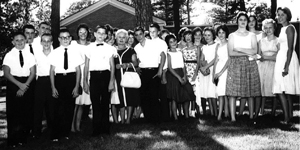
Decade 1: The Man and the Mission
-
Prelude
A movement begins to create an orphanage in the denomination’s Little Rock Conference in 1897.
-
Incorporation
The institution becomes real in 1899, when it is incorporated in Pulaski County as the Arkansas Methodist Orphanage of the Methodist Episcopal Church, South. The trustees are Colonel George Thornburgh, Dr. James Thomas, Reverend J.A. Cason, and George Culberhouse.
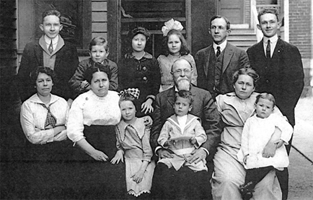
Colonel Thornburgh, the bearded gentleman shown here with his own extended family, would become the champion who, more than anyone, was responsible for the founding and early growth of our mission and facilities for Arkansas children and families.
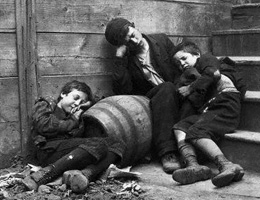 The mission of the orphanage is to provide short-term care for children and help find them homes.
The mission of the orphanage is to provide short-term care for children and help find them homes.The stockholders of the Women’s Industrial Home at Fifteenth and Commerce Streets offer their property, three lots and a two-story building, to the orphanage incorporators. Mrs. L.R. Tabor and Mrs. Logan H. Roots were the property’s largest stockholders.
-
Orphanage Opens
The first location of the Arkansas Methodist Orphanage opens. The first orphan accepted is Jessie Miller of McCrory (Woodruff County).
-
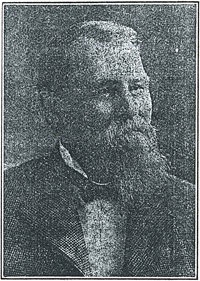 George Thornburgh
George ThornburghGeorge Thornburgh begins a campaign to build a new home and almost single-handedly raises more than $20,000. (That’s more than half a million dollars at today’s purchasing power.) Thornburgh also acts as superintendent, tirelessly working for the orphanage and its children for the next 14 years.
-
New Location
A new location is secured at 16th and Elm.
Decade 2: New Home, New Hope
-
New Location at 16th & Elm Opens
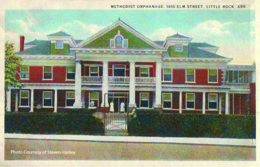 After a two-year fundraising and building effort, the Home’s superintendent and chief booster, George Thornburgh, announces the opening of the new Methodist Orphanage at 16th & Elm in Little Rock.
After a two-year fundraising and building effort, the Home’s superintendent and chief booster, George Thornburgh, announces the opening of the new Methodist Orphanage at 16th & Elm in Little Rock. -
Full-time Matron and Physician Are Employed
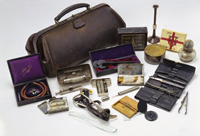 Today, as Methodist Family Health, our mission is the same: to give the best possible care to those who may need our help, including children who are abused, abandoned, neglected and dealing with psychiatric, behavioral, emotional or spiritual issues; and their families.
Today, as Methodist Family Health, our mission is the same: to give the best possible care to those who may need our help, including children who are abused, abandoned, neglected and dealing with psychiatric, behavioral, emotional or spiritual issues; and their families.Now, we bring a lot more manpower to that mission. Our services have expanded statewide, and we employ 500 specialists – psychologists, social workers, teaching parents, behavioral instructors, nurses, cooks and more.
-
Methodist Orphanage Houses Between 30 and 60 Children
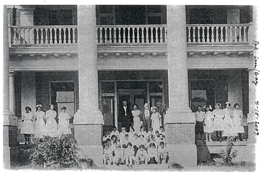 120 years since our founding, Methodist Family Health now offers a continuum of services throughout Arkansas to 5,600 Arkansas children and their families each year.
120 years since our founding, Methodist Family Health now offers a continuum of services throughout Arkansas to 5,600 Arkansas children and their families each year. -
Early Rules of the Methodist Orphanage
• Children were sent to public schools and usefully employed at the home when not in school.
• Mandatory worship services were held each morning and evening.
• Recreational activities were planned for the health and physical development of the residents.
• Not allowed were games that “tended toward gambling” or tobacco use.
• Boys older than 10 and girls older than 14 were not accepted in the home.
Today, as Methodist Family Health, our statewide continuum of services for children starts at age three and continues through the rocky years of adolescence to age 18. (We even provide scholarships for college, training or trade schools for former MFH residents.) We also offer services to support parents and guardians of children with psychiatric, behavioral, emotional and spiritual problems.
Decade 3: Generous Growth
-
Methodist Churches Support the Orphanage
The Methodist Orphanage receives support from church conference assessments as well as donations of quilts, used clothes, an automobile and a fireless cooker. Individual churches contributed food – 27 jars of fruit, 11 sacks of potatoes, one sack of turnips, 10 lbs. of chocolate, three cakes and two gallons of ice cream. Highland Methodist Church in Little Rock took the residents on a shopping trip, providing each of them with $1 to spend.
Today, Methodist Family Health still relies on the generosity of Methodist Churches throughout Arkansas, and on private donations, to help supply the needs of the children in our care. Our Get Up & Give campaign, going on now through the Lenten season, collects donations of practical goods – bedding, clothing, toiletries, toys, books and more. Details on how you can help are here.
-
Rev. James Thomas
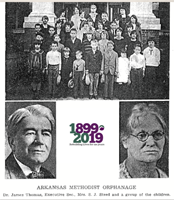 George Thornburgh – the Arkansas Methodist Orphanage’s chief booster, fundraiser and longtime superintendent – dies. Reverend James Thomas takes over as superintendent. He serves for the next 20 years.
George Thornburgh – the Arkansas Methodist Orphanage’s chief booster, fundraiser and longtime superintendent – dies. Reverend James Thomas takes over as superintendent. He serves for the next 20 years. -
440 Children Find Homes
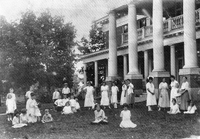
By the mid-20s, the Arkansas Methodist Orphanage had found homes for 440 children.
-
Stock Market Crashes
 The Stock Market crashes, plunging the country into nearly a decade of economic hardship. The Arkansas Methodist Orphanage was blessed with support during the challenging years of the Great Depression. Dr. William A. Snodgrass served as the house physician without pay, and Judge Thomas M. Mehaffy donated his services as the home’s attorney.
The Stock Market crashes, plunging the country into nearly a decade of economic hardship. The Arkansas Methodist Orphanage was blessed with support during the challenging years of the Great Depression. Dr. William A. Snodgrass served as the house physician without pay, and Judge Thomas M. Mehaffy donated his services as the home’s attorney.
Decade 4: Defeating the Depression
-
Nurturing Growth
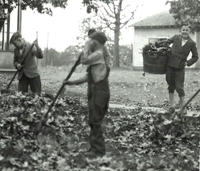 The children of the Arkansas Methodist Orphanage are raised to appreciate educational, physical and spiritual growth. They regularly attend Highland Methodist Church and Lee Elementary School. In their spare time, they perform simple daily chores at the home. Here are some residents of the time taking care of a classic autumn duty.
The children of the Arkansas Methodist Orphanage are raised to appreciate educational, physical and spiritual growth. They regularly attend Highland Methodist Church and Lee Elementary School. In their spare time, they perform simple daily chores at the home. Here are some residents of the time taking care of a classic autumn duty. -
Lean Times
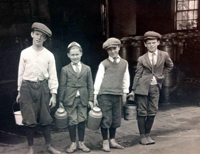 During the lean economic times of the 1930s, Methodist churches throughout Arkansas provide crucial help to the children of the Methodist Orphanage with food and clothing drives, financial donations, and entertainment opportunities.
During the lean economic times of the 1930s, Methodist churches throughout Arkansas provide crucial help to the children of the Methodist Orphanage with food and clothing drives, financial donations, and entertainment opportunities.Even today, Methodist Family Health relies on the kindness of Methodist churches and congregations around the state, as well as private and corporate donations, to help us provide a better life for Arkansas kids.
-
Report
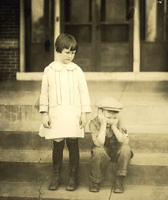
Reverend James Thomas, the longtime superintendent of the Arkansas Methodist Orphanage, reports 22 children were received this year in the home, 15 were placed in permanent homes, and 40 remained in the care of the home.
-
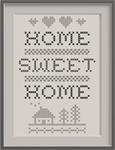 Permanent Homes
Permanent Homes528 children have been placed in permanent homes throughout Arkansas since the Methodist Orphanage was founded.
Decade 5: War and Peace and Growth
-
The Future
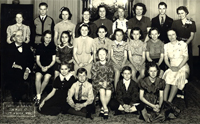 During the years of World War II and the peace that followed, most U.S. orphanages close their doors or evolve into group homes and other youth services. The board of the Methodist Orphanage begins discussions on the future and evolution of their mission.
During the years of World War II and the peace that followed, most U.S. orphanages close their doors or evolve into group homes and other youth services. The board of the Methodist Orphanage begins discussions on the future and evolution of their mission. -
Delegation
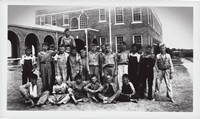 A delegation from the Arkansas Methodist Orphanage visits the Methodist Children’s Home in Waco, Texas, to tour their cottages, housing smaller numbers of residents.
A delegation from the Arkansas Methodist Orphanage visits the Methodist Children’s Home in Waco, Texas, to tour their cottages, housing smaller numbers of residents. -
Location
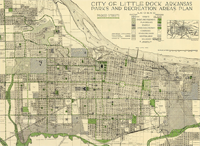
Superintendent Cannon identifies 84 acres of land at what was then the western edge of Little Rock, which could be purchased for $10,000 and serve as a new United Methodist Children’s Home
-
Modern Campus
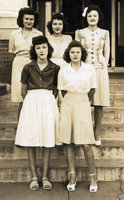 The Arkansas Methodist Orphanage moves from the building it has occupied for 40 years to an 84-acre area on Hayes (now University Avenue) and Fillmore Streets, and becomes a modern, campus-style collection of group homes and support facilities.
The Arkansas Methodist Orphanage moves from the building it has occupied for 40 years to an 84-acre area on Hayes (now University Avenue) and Fillmore Streets, and becomes a modern, campus-style collection of group homes and support facilities.
Decade 6: From Finding a Home to Making a Home
-
Family-Style Living
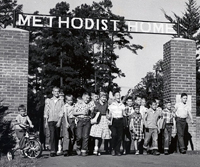 The Arkansas Methodist Orphanage becomes the Methodist Children’s Home. Four cottages, each under the supervision of a housemother, provide residents with family-style living. The purpose of the organization changes from finding a home to making a home for each child in our care. Services expand from housing orphans to include abandoned and neglected children needing special long-term care
The Arkansas Methodist Orphanage becomes the Methodist Children’s Home. Four cottages, each under the supervision of a housemother, provide residents with family-style living. The purpose of the organization changes from finding a home to making a home for each child in our care. Services expand from housing orphans to include abandoned and neglected children needing special long-term care -
System Expansion
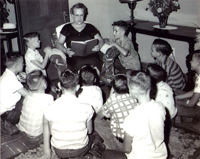 Satellite locations of the expanding Methodist Children’s Home system open in Searcy, Magnolia, Ft. Smith and Marked Tree.
Satellite locations of the expanding Methodist Children’s Home system open in Searcy, Magnolia, Ft. Smith and Marked Tree. -
Buildings Added
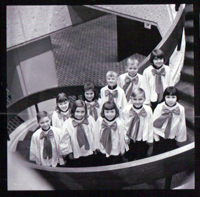
The Methodist Children’s Home adds more cottages, a chapel and an activities building.
-
Postsecondary Education
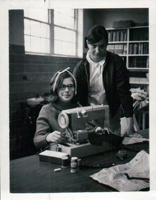 Residents of the Methodist Children’s Home are offered educational opportunities after completing high school, including business courses, beauty school, nurses’ training and college. Hendrix College offers financial assistance to those students in the home who qualify.
Residents of the Methodist Children’s Home are offered educational opportunities after completing high school, including business courses, beauty school, nurses’ training and college. Hendrix College offers financial assistance to those students in the home who qualify.
Decades 7-8: The Times They Are A-Changing
-
Construction
-
Chapel Services
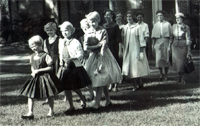 St. James United Methodist Church organizes and holds worship services in the chapel at the Methodist Children’s Home in Little Rock.
St. James United Methodist Church organizes and holds worship services in the chapel at the Methodist Children’s Home in Little Rock. -
Statewide Expansion
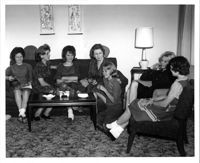
The first group home outside of Little Rock, Magale Youth Home in Magnolia, Arkansas, is dedicated. By 1971, groups homes are established in Arkadelphia, Fort Smith, Marked Tree and Searcy.
Decades 9-10: Rounding Out a Century of Service
-
Learning Center
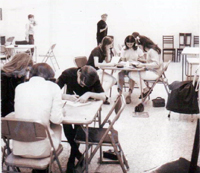
Methodist Children’s Home adds a basic-skills learning center to its Little Rock campus. This center helped children who had problems in school or needed tutoring.
-
Teaching-Family Homes
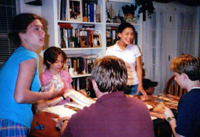 Methodist Children’s Home is certified as a Teaching-Family Sponsor site. Community-based teaching-family group homes are established in Batesville, Searcy, Magnolia and Little Rock. Two additional group homes open in Fayetteville and Springdale.
Methodist Children’s Home is certified as a Teaching-Family Sponsor site. Community-based teaching-family group homes are established in Batesville, Searcy, Magnolia and Little Rock. Two additional group homes open in Fayetteville and Springdale. -
Accreditation

Methodist Family Health is accredited by Joint Commission on Accreditation of Healthcare Organizations.
-
100 Years
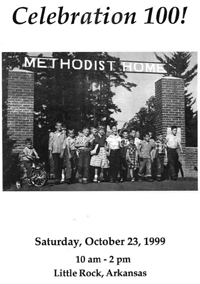
Methodist Family Health celebrates its 100th anniversary.
Decade 11: Expanding Impact
-
Behavioral Hospital

The Methodist Behavioral Hospital is established in Maumelle.
-
Incorporation
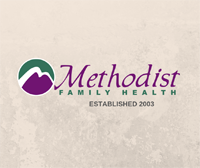 Methodist Family Health, the management company of the United Methodist Children’s Home, Methodist Behavioral Hospital and Methodist Counseling Clinics, is incorporated.
Methodist Family Health, the management company of the United Methodist Children’s Home, Methodist Behavioral Hospital and Methodist Counseling Clinics, is incorporated. -
New Group Home

A new therapeutic group home opens in Helena-West Helena.
Decade 12: Methodist Family Health in the 21st Century
-
Meeting Needs Statewide
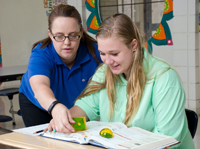
The emergency shelter opens in Little Rock, two school-based counseling clinics open in Jonesboro and Vilonia, and the Fayetteville Counseling Clinic opens.
-
Giving the Best Possible Care
 Arkansas CARES becomes a program of Methodist Family Health.
Arkansas CARES becomes a program of Methodist Family Health.A psychiatric residential treatment center opens in Bono in northeast Arkansas.
-
Acute Inpatient Treatment Expands
Methodist Family Health purchases a 60-bed hospital in Jonesboro, expanding our acute inpatient treatment options to two hospitals. Methodist Behavioral Hospital in Maumelle is renamed Methodist Children’s Behavioral Hospital – Maumelle, and this new hospital in northeast Arkansas is Methodist Children’s Behavioral Hospital – Jonesboro. Together, they are the only nonprofit behavioral hospitals for children in the state.



